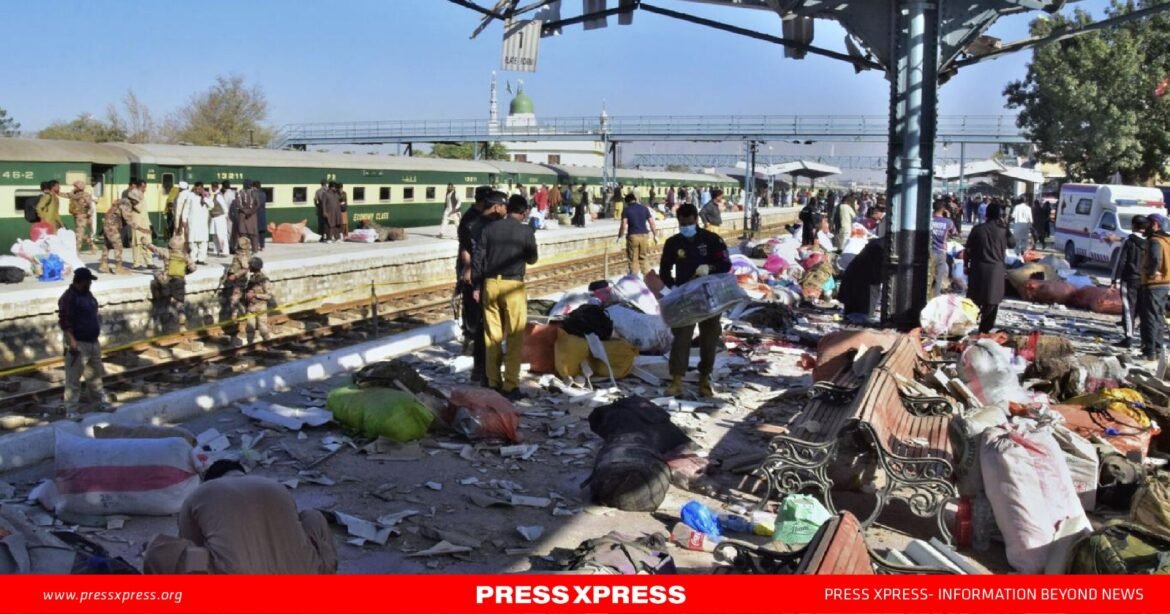At least 25 people were killed and dozens more injured when a bomb exploded at a railway station in Quetta, the capital of Pakistan’s Balochistan province, on Saturday morning. The attack occurred as a popular train was preparing to depart for Peshawar, leaving scenes of devastation and panic among passengers.
Authorities believe the blast was caused by a suicide bomber, a claim that was later confirmed by the Balochistan Liberation Army (BLA), a separatist group that has previously targeted both Pakistani military and civilian targets. In a statement posted on social media, the BLA said it carried out the bombing in retaliation against a military unit returning from a training course in Quetta. Police later confirmed that 14 soldiers were among the victims.

Police officials reported that the bomb weighed between 6 and 8 kilograms. The explosion injured approximately 50 people, many of whom were rushed to nearby hospitals. The explosion targeted the station at a time when the platform was crowded with commuters, including civilians and military personnel. Among the injured was Abdul Jabbar, who described the scene as “a judgment day,” recounting his experience of entering the station just before the blast occurred.
Muhammad Sohail, another witness, said, “Everything was destroyed at the station, and people were laying on the ground screaming for help.” Social media videos showed the immediate aftermath, with debris scattered across the station and emergency responders working to assist the wounded.
Balochistan’s Unstable Security Environment
This bombing marks the latest in a series of violent attacks in Balochistan, a province rich in natural resources but economically underdeveloped. The BLA has been fighting for greater autonomy, accusing the central government of exploiting the region’s resources while neglecting its people. The group frequently targets energy infrastructure, particularly projects involving foreign investments, such as those backed by China.
Pakistan’s Prime Minister Shehbaz Sharif condemned the attack, pledging to bring those responsible to justice. “The terrorists who have harmed innocent civilians will pay a heavy price,” Sharif said in a statement following the blast.
The chief minister of Balochistan also denounced the attack, calling it “deplorable” and vowing to track down the perpetrators. Sardar Ayaz Sadiq, the Speaker of Pakistan’s National Assembly, joined in the condemnation, labeling the attackers as “enemies of humanity.”
Political Reactions and Growing Militancy
The attack on Quetta station comes amid rising militancy across Pakistan, particularly in the volatile western regions bordering Afghanistan and Iran. A military clash earlier in the week near the Afghan border left four Pakistani soldiers and five militants dead, highlighting the persistent security challenges in the area. The Pakistani government has accused the Taliban, which returned to power in Afghanistan in 2021, of failing to curb militant activity along the border.
In a statement released by the Prime Minister’s office, Sharif expressed “grief and sorrow” over the deaths and reaffirmed the government’s commitment to defeating terrorism. “Our war against terrorists will continue until the complete elimination of terrorism from the country,” the statement read.
Balochistan: A Region of Contradictions
Balochistan, Pakistan’s largest and most resource-rich province, remains one of its least developed. Despite its vast natural resources, the province has long suffered from poverty and political instability. The region shares a porous border with Afghanistan and Iran, making it a hotspot for insurgent groups. In recent years, separatist movements and militant factions have intensified their attacks, further destabilizing the region.
The BLA, in particular, has made headlines for its attacks on security forces and civilians, including a series of bombings in August that killed at least 39 people. Separatists argue that Balochistan’s resources are being exploited by Pakistan and foreign companies, leaving the province’s residents in poverty.
As Pakistan confronts this ongoing violence, the government faces difficult questions about its approach to the Taliban and the increasing militancy along its western border. Analysts warn that the country’s failure to address these deep-rooted issues could fuel further instability in the region.


